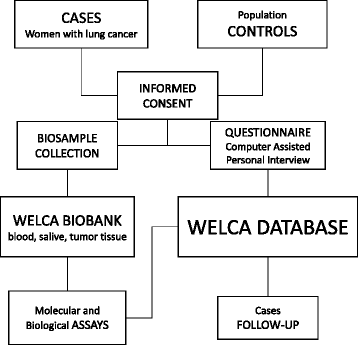Women Epidemiology Lung Cancer (WELCA) study: reproductive, hormonal, occupational risk factors and biobank
- PMID: 28415992
- PMCID: PMC5392991
- DOI: 10.1186/s12889-017-4191-1
Women Epidemiology Lung Cancer (WELCA) study: reproductive, hormonal, occupational risk factors and biobank
Abstract
Background: Lung cancer aetiology and clinical aspects have been mainly studied in men, although specific risk factors probably exist in women. Here we present the rationale, design and organization of the WELCA study (Women Epidemiology Lung CAncer) that has been launched to investigate lung cancer in women, focusing particularly on hormonal and occupational factors.
Methods/design: WELCA is a population based case-control study and planned to recruit 1000 cases and 1000 controls in three years, based on study power calculation. Eligible cases are female patients newly diagnosed with lung cancer, living in Paris and the Ile de France area and aged up to 75 years. Almost all Parisian pneumology and oncology clinical departments are involved. The control group is a random sample of the population living in the same area, frequency-matched on age and additionally stratified on the distribution of socio-professional categories of women residing there. After acquisition of written consent, research nurses administer standardized computer assisted questionnaires to all the subjects in face-to-face interviews and acquire anthropometric measures. Besides usual socio-demographic characteristics, information is gathered about menstrual and reproductive factors, hormonal treatments, lifestyle and leisure characteristics, occupational history, personal and familial medical history. Biological samples are also collected, in order to establish a biobank for molecular epidemiology studies. Molecular characteristics of the tumours will be obtained and patients will be followed up for five years.
Discussion: The WELCA study aims to answer key questions in lung cancer aetiology and clinical characteristics specifically in women. The role of hormonal impregnation is investigated, and the interactions with cigarette smoking or body mass index (BMI) will be analyzed in detail. The occupational history of the subjects is carefully reconstructed, focusing in particular on the service sector. The creation of a biobank for collection of serum, plasma, DNA and tumour tissue will allow the genetic and biochemical characterization of both the subjets and the tumours. The follow-up of the patients will help in disentangling the role of hormonal factors and tumour molecular characteristics in survival.
Keywords: Biological specimen banks; Case-control studies; Estrogens; Female; Lung neoplasms; Molecular epidemiology; Occupational exposure; Reproductive history; Surveys and questionnaires.
Figures
References
-
- Remon J, et al. Lung cancer in women: an overview with special focus on Spanish women. Clin Transl Oncol. 2014;16(6):517–528. - PubMed
Publication types
MeSH terms
Grants and funding
LinkOut - more resources
Full Text Sources
Other Literature Sources
Medical


